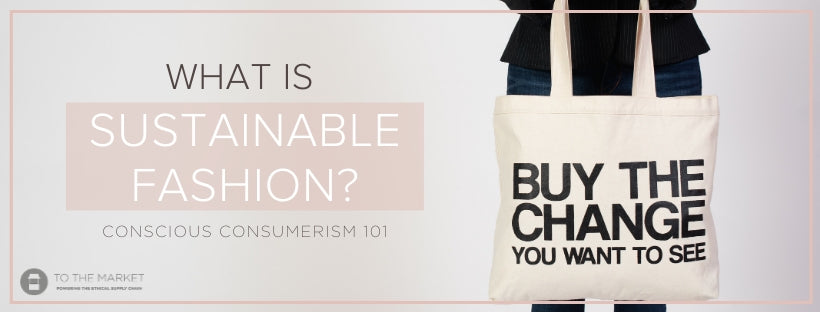
Conscious Consumerism 101: What is Sustainable Fashion?
Share
This letter is part of our Conscious Consumerism 101 series, a guide to help you make empowered, ethical choices when shopping. Today, a look into sustainable fashion.
Have you noticed your favorite bloggers tagging more and more outfits with #sustainablefashion? What about the influx of fashionistas singing the praises of secondhand clothes? You’re not imagining things: we’re in the midst of a shopping revolution. As more consumers learn more about the challenging human and environmental costs of the fast fashion industry, the sustainable fashion movement continues to grow in its place. So what, exactly, makes an outfit or accessory sustainable? And how can you know whether your purchase makes a positive impact?
It’s all in the details.
There isn’t a single all-or-nothing factor that deems a textile product completely sustainable or unsustainable. Instead, the impact of your clothes and bags can be measured on something of a spectrum. Here are a few questions to ask before making a textile purchase. Any “yes” puts the product leaps and bounds ahead of the average textile on the market.
Is your tee or tote made of organic materials?
When a textile is labeled as organic, it means its materials were grown without pesticides, herbicides, or other chemicals. There are a few different organic certifications to keep an eye out for. If a product has a Global Organic Textile Standard (GOTS) certification, it means that every step of the creation product adhered to organic standards, and that the product is made of at least 70% organic natural fibers. You’ll also want to watch for Organic 100 Content Standard or Organic Blended Content Standard labels, which means that the product has undergone a transparent organic manufacturing process from start to finish.
Are your clothes and accessories free of harmful chemicals?
Textiles are sometimes manufactured with harmful substances that can hurt both factory employees and the shopper who ultimately buys the product. The catch is that clothes with these substances might seem fine at first, only to cause health issues later down the line. To avoid this, check to see if the product has the OEKO-TEX Standard 100 Label. This means that every part of the product, right down to the buttons and tags, has been tested for substances that are harmful to humans.
Were the people who made the clothes treated with respect?
A fair trade certification is an indicator that your clothes, bags, or other textiles were made by people who received a fair wage for their work. Fair trade products have passed through a series of strict standards to ensure that they are made sustainably and ethically. (If you've got questions, we’ve got a deeper breakdown on the details of fair trade in Part One of our conscious consumerism guide.)
What about recycled materials?
Recycled and upcycled clothes and bags are one of our strongest lines of defense against landfills piling high with clothing. Keep an eye out for products with a Global Recycled Standard label. This means that the content of the recycled materials in your product have been verified along each step of the supply chain.
If you’re asking questions like these, you’re already well on your way to buying the change you want to see. Each informed clothing or swag purchase you make is a step forward in the fight against fast fashion - and there’s nothing more stylish than that.
